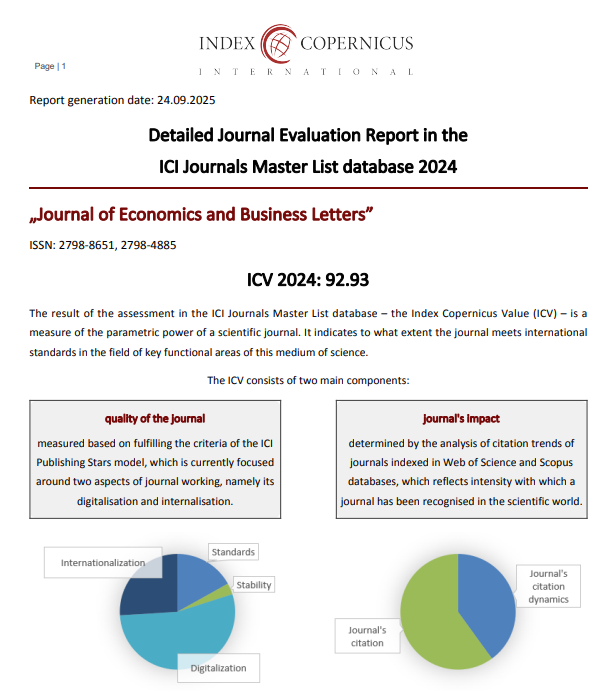Research trends in entrepreneurship in the digital era: A bibliometric analysis
DOI:
https://doi.org/10.55942/jebl.v4i6.335Keywords:
entrepreneurship, digital era, bibliometricAbstract
In the digital era, entrepreneurs have begun to leverage ICT and its social capital to overcome obstacles and grow their firms. The idea that digital technology can help address the issues faced by sustainable businesses has gained traction in recent studies. To develop research related to entrepreneurship in the digital era and the potential for new research on this topic. This research used descriptive analysis methods for journal articles indexed in Scopus and Google Scholar. This study investigates the literature using bibliometric analysis methods in five stages: data collection, keyword selection, matrix calculation, result visualization, and data interpretation and visualization results. According to the bibliometric analysis, there were 11 clusters, 161 items, and 447 links with a link strength of 500. Furthermore, according to Scopus and Google Scholar data, most studies on entrepreneurship in the digital era are related to the business environment, pandemics, digital entrepreneurs, digital entrepreneurship ecosystems, digital media, existence, financial literacy, and financial technology. In conclusion, during 2018-2023, there is an increasing trend in digital-era research subjects. Bibliometric analysis, though comprehensive in identifying clusters and connections, may not capture the qualitative nuances and deeper insights within individual studies. This study contributes significantly by mapping the evolving digital entrepreneurship research from to 2018-2023. Through a comprehensive bibliometric analysis, it identifies key research clusters and trends, providing valuable insights for academics, policymakers, and practitioners. The findings illuminate the interconnections between the business environment, pandemic impacts, and technological advancements in digital entrepreneurship.
References
Adiatma, T., Irianto, O., Siamsa, S., & Suwandi, S. W. (2023). Strategic Management to Envisage the Challenges of Inclusive Economy and Business Innovation: A Bibliometric Study. Journal of International Conference Proceedings, 6(5), 47–67. https://doi.org/10.32535/jicp.v6i5
Bouncken, R., & Barwinski, R. (2021). Shared digital identity and rich knowledge ties in global 3D printing—A drizzle in the clouds? Global Strategy Journal, 11(1), 81–108. https://doi.org/10.1002/gsj.1370
Carayannis, E. G., Barth, T. D., & Campbell, D. F. (2012). The Quintuple Helix innovation model: global warming as a challenge and driver for innovation. Journal of Innovation and Entrepreneurship, 1(1). https://doi.org/10.1186/2192-5372-1-2
Chen, X., Chen, J., Wu, D., Xie, Y., & Li, J. (2016). Mapping the Research Trends by Co-word Analysis Based on Keywords from Funded Project. Procedia Computer Science, 91, 547–555. https://doi.org/10.1016/j.procs.2016.07.140
Dabbous, A., Barakat, K. A., & Kraus, S. (2023). The impact of digitalization on entrepreneurial activity and sustainable competitiveness: A panel data analysis. Technology in Society, 73. https://doi.org/10.1016/j.techsoc.2023.102224
Gregori, P., & Holzmann, P. (2020). Digital sustainable entrepreneurship: A business model perspective on embedding digital technologies for social and environmental value creation. Journal of Cleaner Production, 272, 122817. https://doi.org/10.1016/j.jclepro.2020.122817
Haryani, C. S., Sudin, A., & Atun, I. (2020). Analisis Bibliometrik Tren Publikasi dan Tingkat Kolaborasi Pada Model Situation-Based Learning (2010-2019). Jurnal Pena Ilmiah, 3(2), 131–140.
Heersmink, R., van den Hoven, J., van Eck, N. J., & van Berg, J. den. (2011). Bibliometric mapping of computer and information ethics. Ethics and Information Technology, 13(3), 241–249. https://doi.org/10.1007/s10676-011-9273-7
Irianti, P. (2016). Studi Bibliomteri Media Komunikasi Ilmiah Berkala Perpustakaan dan Informasi. 18(1), 69–80.
Irianto, O., & Adiatma, T. (2023). Financial Sustainability Publication Trend: A Bibliometric Study. Academic Journal of Interdisciplinary Studies, 12(5), 132. https://doi.org/10.36941/ajis-2023-0132
Kromidha, E., & Robson, P. J. A. (2021). The role of digital presence and investment network signals on the internationalisation of small firms. International Small Business Journal: Researching Entrepreneurship, 39(2), 109–129. https://doi.org/10.1177/0266242620958898
Luo, J., Fan, M., & Zhang, H. (2012). Information technology and organizational capabilities: A longitudinal study of the apparel industry. Decision Support Systems, 53(1), 186–194. https://doi.org/10.1016/j.dss.2012.01.003
Niebel, T. (2018). ICT and economic growth – Comparing developing, emerging and developed countries. World Development, 104, 197–211. https://doi.org/10.1016/j.worlddev.2017.11.024
Nuryudi. (2016). Analisis Bibliometrika Islam : Studi kasus Dokumentasi Publikasi Ilmiah di UIN Syarif Hidayatullah Jakarta. Al-Maktabah, 15, 41–56.
Paul, J., Alhassan, I., Binsaif, N., & Singh, P. (2023). Digital entrepreneurship research: A systematic review. Journal of Business Research, 156. https://doi.org/10.1016/j.jbusres.2022.113507
Phan, P., Zhou, J., & Abrahamson, E. (2010). Creativity, Innovation, and Entrepreneurship in China. Management and Organization Review, 6(2), 175–194. https://doi.org/10.1111/j.1740-8784.2010.00181.x
Ratten, V. (2023). Digital platforms and transformational entrepreneurship during the COVID-19 crisis. International Journal of Information Management, 72. https://doi.org/10.1016/j.ijinfomgt.2022.102534
Reuber, A. R., & Fischer, E. (2011). International entrepreneurship in internet-enabled markets. Journal of Business Venturing, 26(6), 660–679. https://doi.org/10.1016/j.jbusvent.2011.05.002
Tsai, S. B., Cheng, X., Yang, Y., Xiong, J., & Zarifis, A. (2023). The social-technological ways to develop digital entrepreneurship: Targeting value creation and value capture. In Information Processing and Management. Elsevier Ltd. https://doi.org/10.1016/j.ipm.2023.103568
Downloads
Published
How to Cite
Issue
Section
License
Copyright (c) 2024 Okto Irianto, Tini Adiatma, Agustin Bagu

This work is licensed under a Creative Commons Attribution 4.0 International License.
















